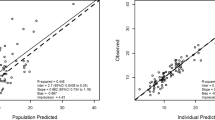Abstract
Systemic infections with Candida albicans in neonates are a frequent and well recognized problem. The therapeutic gold standard in this situation is the combined intravenous antimycotic treatment with amphotericin B and flucytosine. Potential adverse effects of this regimen have encouraged the search for desirable alternatives. We report on the use of oral fluconazole in neonates with Candida albicans septicaemia. Three premature infants were treated with four courses of therapy. Pharmacokinetic studies were performed during each course.
At oral doses of 4.5–6 mg/kg once a day, serum levels of fluconazole were within the therapeutic range during the entire dosage interval. Follow up showed microbiological and clinical cure in all patients with no side-effects. In one patient a dosage of 4 mg/kg per day lead to a microbiological relapse with sub-therapeutic serum levels.
Conclusions Oral fluconazole seems to be a safe and effective treatment for Candida albicans septicaemia even in premature infants.
Similar content being viewed by others
Author information
Authors and Affiliations
Additional information
Received: 6 March 1997 / Accepted in revised form: 12 November 1997
Rights and permissions
About this article
Cite this article
Wenzl, T., Schefels, J., Hörnchen, H. et al. Pharmacokinetics of oral fluconazole in premature infants. Eur J Pediatr 157, 661–662 (1998). https://doi.org/10.1007/s004310050906
Issue Date:
DOI: https://doi.org/10.1007/s004310050906




